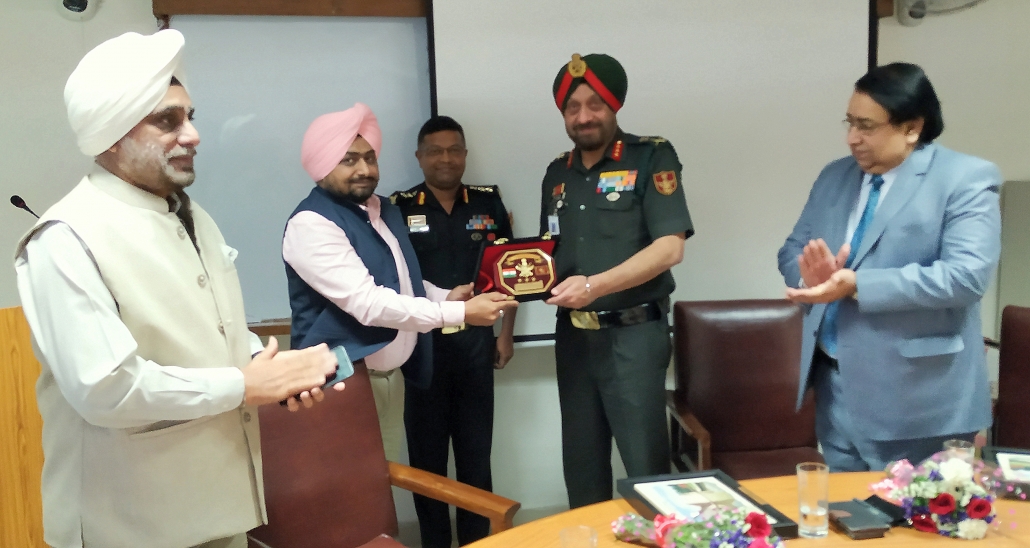Chandigarh

Special Lecture on [UTF-8?]“Understanding Future [UTF-8?]Warfare” by Lt.
Gen. P. J. S. Pannu, Deputy Chief Integrated Defence Staff at the
Department of Defence and National Security Studies.
The Department of Defence and National Security Studies,
Panjab University, Chandigarh organised a special lecture on the theme
[UTF-8?]“Understanding Future [UTF-8?]Warfare” by Lt. Gen. P. J. S. Pannu, PVSM, AVSM,
VSM, Deputy Chief Integrated Defence Staff (Doctrine, Organisation and
Training) on 18 th April 2019 in the department premises.
Dr. Jaskaran Singh Waraich, Chairperson, Department Defence and
National Security Studies, introduced the theme as well as the speaker
to the audience. He also highlighted the fact that the theme of the
seminar is an official part of the curriculum of the [UTF-8?]master’s
programme in the department.
The lecture was presided over by Sh. R. K. Kaushik, Secretary
Power and Divisional Commissioner, Roopnagar, Government of Punjab.
The proceedings of the lecture were initiated by Sh. R. K. Kaushik. He
said that the history of war is is as old as that of society. In the
previous century, the world witnessed two world wars which were one of
the most devastating wars ever. As a result of the Second World War, a
lot of countries gained independence. Our nation India was one of
them. Since
Independence, India intended to remain a peace-loving country. But
within a few months, war was forced on India in the form of the
Pakistani invasion of Kashmir followed by their capture of large
portion of Indian territory in J&K. In 1962, our northern
neighbour China attacked us and once again India was involved in war.
Keeping these instances in mind and the fact that we are surrounded by
perennial enemies, we must always remain prepared as far as national
security is concerned.
Explaining Future Warfare, Gen. Pannu spoke about how human
beings have been the most dangerous species to ever exist on this
planet. In order to understand the nature of war, we must first
understand the nature of human beings. In the course of their
evolution, Human
Beings have become involved in a conflict against nature and in the
recent times humans are trying to outsource this conflict via
employment of machines. Quoting Kautilya, he explained how the world
is slowly shifting from the age of Prakasha Yuddha (Open War) to the
age of
Kuta Yuddha (Deception War), Tusnim Yuddha (Silent / Cyber War),
Mantra Yuddha (Information War) and Gudha Yuddha (Irregular and
Concealed War). With its present rate of its growth, the human
population would in the future start exceeding the [UTF-8?]planet’s capacity
for sustaining life. Now we have become a consumerist society.
Talking about the evolution of warfare, Gen Pannu explained
the geopolitical importance of the main island of the world and also
tried to establish the link between the various industrial revolutions
and generations of warfare. He suggested that because at the time of
Independence the strength of the Indian Army was around 2.2 million
soldiers, which would have easily made India a military power.
However, the then world powers, engaged in the Great Game, divided
India to prevent this.
He said that just like Germany tried to gain control over this
heartland during the world war two, in the present day, China, which
is a peripheral country has started making inroads in this region and
the tool they are using is trade and soft power influence of their
economy. In this backdrop, any nation that fails to understand Fourth
Generation Warfare will get defeated in case of war.
While highlighting the transition from Sensing to Sense
Making, he said that first, computing changed the speed and complexity
with which we could process information. Then, communication broadened
our access in both time and space and connected us globally. In this
decade, sensing devices are having the most profound effect as they
bring information,
awareness and responsiveness to the objects, places and people around
us. The next wave of technology will be all about sense making [UTF-8?]– the
ability to make sense out of the enormous amount of information and
sensory signs all around us. Lt Gen K. J. Singh, Maharaja Ranjit Singh
Chair and State Information Commissioner, Haryana also highlighted the
necessity for our security forces as well as civilians to develop an
understanding of the future of warfare.
The lecture was attended by members of Gyan Setu Think-tank,
various faculty members, serving and retired armed forces officers
pursuing various courses in the department, research scholars and
students. The lecture was followed by a questions and answers session
with the audience.

![Panjab University, Chandigarh organised a special lecture on the theme [UTF-8?]“Understanding Future [UTF-8?]Warfare” by Lt. Gen. P. J. S. Pannu, PVSM, AVSM, प्रथम भारत रत्न गली क्रिकेट टूर्नामेंट के दूसरे दिन 37 मैच सफलता पूर्वक खेले गए](https://news7world.com/wp-content/uploads/2019/03/s1.jpg)
